Mark Anthony Neal's Blog, page 424
November 6, 2018
“When We All Vote”: A First Lady’s Democratic Lens
 “When We All Vote”: A First Lady’s Democratic Lens by Wilfredo Gomez | @BazookaGomez84 | NewBlackMan (in Exile)
“When We All Vote”: A First Lady’s Democratic Lens by Wilfredo Gomez | @BazookaGomez84 | NewBlackMan (in Exile)Recently BET hosted Angela Rye’s Midterm Election Special: Our Vote, Our Power a critical dialogue about the elections some have labeled “the most important in a generation.” The special featured figures such as Valerie Jarrett and Corey Booker touching on topics such as criminal justice reform, restoring the vote, voter purges in Georgia, black women on the 2018 ballot, and voter protection laws. Moreover, the viewing audience received information on states holding early voting and the number of black folk who hold elected positions. One of the most poignant moments featured Rye’s exclusive interview with “our forever First Lady” Michelle Obama.
Rye began the conversation asking Obama to discuss her earliest voting memory. She proceeded to chronicle the ways her father embodied the essence of democratic participation and civic engagement. A precinct captain in Chicago, Fraser Robinson III, worked collaboratively with the city’s alderman to ensure that surrounding neighborhoods had whatever resources they needed. Robinson was a firm believer in active civic engagement, developing an intimate relationship with neighbors, wherein they were not solely votes to be courted and casted, but names, experiences, relationships, and perspectives that were indicative of the inherent potential wealth of democracy when all felt included and had access to the vote.
The patriarch of the Robinson family represented a key cog in that democratic spoke wheel, an intersectional identity that saw blackness and disability as being interdependent co-texts, much like the lyrics and instrumental of a multilayered track, his identities were in sync with one another. Crutches (a constant and ever-present reference point for Obama as reflects on the memories and legacy of her father) were a vehicle and extension of the body, enabling Robinson in his efforts to navigate the urban terrain, exercising the vote and mobilizing a community in spite of rain, snow, or pain. Democracy moves with and through this disabled body, to paraphrase Angela Rye during the course of that discussion.
While Obama suggests that multiple sclerosis is the disease that ultimately took her father’s life, she appears conscious and deliberate about deploying the language of disability to characterize the ways in which disability functions as a metaphorical albatross wherein society becomes inhibited from embodying its intended altruistic objectives. The image of the black disabled body is a norm for Obama, as she recalls both impairment and the societal obstacles that inform a larger apparatus of disability. In remembering her father, we as viewers are sensitive, through language and narrative, to the qualitative experiences that illuminate data from the CDC noting that one in four Americans lives with a disability. But more importantly, Obama’s story affords us a critical lens from which to evaluate and assess notions of social justice leadership and disability inclusion.
I raise this point thinking about the credible and legible body. Legibility, a reference point for a pedagogical project centered on the literacy or literacies of the body, addresses questions/discourses of humanity, while credibility recognizes the embodied/performed identities that exist at the intersections. The latter point raises the question of whether or not people will be permitted to claim a safe space in their own skin, and be their true selves. For Robinson, this true self, was a democratic self, a voting self that saw blackness functioning at the intersections of disability. While not tangible with regards to finances, influence, or control, Obama suggests that voting as a black disabled man wielded a power that exceeded the boundaries of democratic inclusion to consider questions of access.
Collectively, thoughtful reflection on these experiences inform Obama’s newest initiative When We All Vote, a manifestation of her own intersectionality: a black woman whose formative democratic experiences come in intimate contact with disability. In further politicizing disability as a category for community building, disability disrupts the narratives of both the raw numbers of citizens who in fact do not exercise that right (to vote), and the statistical data that informs how politicians go about being self-selective in their canvassing of community pre and post election cycle, a conscious course of actions and political ideologies based on populations who are either non-voters, or are themselves grossly underrepresented as such.
Disabling the electoral process, as my analytical reading suggests, is to disrupt the societal obstacles that have been barriers to democratic participation, giving way to voter purges as evidenced in the Georgia Gubernatorial race. If we think and vote intersectionally, as Obama’s We All Vote campaign suggests, we as a society fill in Angela’s Rye prompt to finish this sentence, “When we all vote…”
***
Wilfredo Gomez is an independent scholar and researcher. He can be reached at gomez.wilfredo@gmail.com or via twitter: @BazookaGomez84.
Published on November 06, 2018 13:48
Natasha Trethewey: Poetry Speaks 'Across The Lines That Would Divide Us'
 photo: Andrew Kornylak'Natasha Trethewey — former Poet Laureate of the United States — has a new collection of poems out about American history, personal history, and the lives of people who are often overlooked by history and unsung in poetry. It's called Monument, and Trethewey says her own tragic personal history — her mother was murdered by her second husband — is part of what made her a poet. "It feels very much to me that out of the ruin of her life, I was able to fashion a life for myself," she says, "in which I not only survived but also thrived."' -- Weekend Edition Saturday
photo: Andrew Kornylak'Natasha Trethewey — former Poet Laureate of the United States — has a new collection of poems out about American history, personal history, and the lives of people who are often overlooked by history and unsung in poetry. It's called Monument, and Trethewey says her own tragic personal history — her mother was murdered by her second husband — is part of what made her a poet. "It feels very much to me that out of the ruin of her life, I was able to fashion a life for myself," she says, "in which I not only survived but also thrived."' -- Weekend Edition Saturday
Published on November 06, 2018 03:50
November 5, 2018
The Colored Girls Who Shaped American Politics
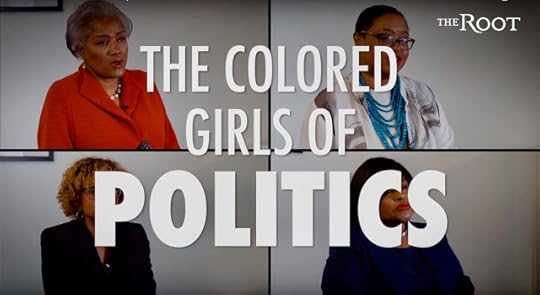 'Donna Brazile, Yolanda Caraway, Rev. Leah Daughtry, and Minyon Moore are history makers and have a hand in making American political history. This is their story.' -- The Root
'Donna Brazile, Yolanda Caraway, Rev. Leah Daughtry, and Minyon Moore are history makers and have a hand in making American political history. This is their story.' -- The Root
Published on November 05, 2018 18:09
Regina King Shares Advice to Young Women
 from the Variety "Power of Women" cover shoot with actress and director Regina King, who discusses her relationship with the I Have a Dream Foundation.
from the Variety "Power of Women" cover shoot with actress and director Regina King, who discusses her relationship with the I Have a Dream Foundation.
Published on November 05, 2018 17:57
2018 Walter Annenberg Lecture: Kara Walker
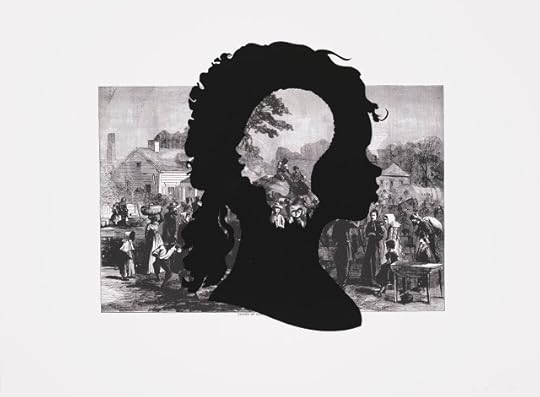 'Kara Walker is best known for her candid investigation of race, gender, sexuality, and violence using historical images and forms. For the 2018 Walter Annenberg Annual Lecture, she speaks with Adam D. Weinberg, the Whitney's Alice Pratt Brown Director, about her practice and discusses how art can address the ongoing legacy of slavery in contemporary American life.' -- Whitney Museum of American Art
'Kara Walker is best known for her candid investigation of race, gender, sexuality, and violence using historical images and forms. For the 2018 Walter Annenberg Annual Lecture, she speaks with Adam D. Weinberg, the Whitney's Alice Pratt Brown Director, about her practice and discusses how art can address the ongoing legacy of slavery in contemporary American life.' -- Whitney Museum of American Art
Published on November 05, 2018 17:42
The 3,000-year History of the Hoodie
 'The hoodie is a lot more than just a comfy sweatshirt. Design curator Paola Antonelli takes us through its history.' -- TED
'The hoodie is a lot more than just a comfy sweatshirt. Design curator Paola Antonelli takes us through its history.' -- TED
Published on November 05, 2018 17:31
November 4, 2018
“Shut Up and Rap”: The Tale of Two of Antonio Delgados
 “Shut Up and Rap”: The Tale of Two of Antonio Delgados
by Wilfredo Gomez | BazookaGomez84 | NewBlackMan (in Exile)
“Shut Up and Rap”: The Tale of Two of Antonio Delgados
by Wilfredo Gomez | BazookaGomez84 | NewBlackMan (in Exile) Identity matters. Representation matters. Context matters...it always has. The race for New York’s 19th Congressional District, pitting incumbent Republican Representative John Faso and his opponent Antonio Delgado is heating up and making national news. These stories arise in the context of a recent tweet sent out by President Trump, a campaign ad that affords Willie Horton, a first-rate face lift in the age of digital media technologies, fanning the waves of xenophobia, anti-immigrant sentiment, and the continued efforts to demonize and pathologize brown and black bodies. Image, text, and rhetoric, work in relative symbiosis to make character judgments, offer policy evaluations/critique, and make generalized assessments about the kinds of representation needed to help propel this country forward.
The race facing the electorate in New York’s 19th congressional district is no different. On October 31, 2018, Republican Representative John Faso appeared on Primetime with Chris Cuomo. From the outset it was clear that the host wanted to hold Faso accountable for running ads that used the coded language of hip-hop as a stand in for values and issues; the issues that have been depicted to be outside the purview of Delgado’s expertise, know-how, and most provocatively, his capacity to conceptualize areas of concern: a reflection of his inability to empathize and acclimate himself to a district where Faso has lived and worked for over 30 years (or so goes his line of reasoning and self-defense).
But let us take a step a back for a second, and put forth another proposition: pedigree matters. But which one? Therein lies a perceived duality that seems a bit difficult for Faso and his backers to envision. On the one hand, we have Antonio Delgado, Harvard educated attorney and Rhodes Scholar. On the other hand, we have “A.D. The Rapper,” an artistic persona performed by Delgado, an artist who once used the pulpit of hip-hop to engage in social critique, tackling subject matter such as foreign policy, first-amendment rights, and a more expansive unpacking of democratic engagement.
As per one of the central arguments in this race, the fact that these realities can be contained in the same body seems far fetched. How can a former rapper turned Harvard graduate and Rhodes Scholar, have political ambitions? Such ambitions and successes for hip-hop are not new as evidenced by Shawn “Jay-Z” Carter and Curtis “50 Cent” Jackson. Yet, none of them has ever ran for office, nor expressed interest in doing so. This is electoral politics after all, not the art of the deal, nor a hustle to be bragged about in recordings. The 19th Congressional District is far from being hip-hop, Republicans have seen to that. The processes of being and becoming are depicted as a static, yet universal undertaking of human development so long as it does not disrupt or counter hegemonic conceptualizations of “values” and “culture.”
By running ads that draw a clear and intimate connection between hip-hop, race, and the disposition of a politician, Faso and his supporters are essentially telling Delgado and by extension, Democrats to shut up and rap. I say this riffing on the words of Fox News host Laura Ingraham, wherein she directed the words, “shut up and dribble” towards NBA megastar Lebron James. The effect of such a claim is felt when identity and identity politics become mired in discourses of essentialism and authenticity. Furthermore, what results from this myopic approach is a closing off of democratic access and inclusion. It becomes readily apparent, that figures like Delgado, much like the commentary made about James, posit an either/or binary. One can either be a philanthropist, cultural critic and social justice warrior or a basketball player in James’ case.
In the case of Delgado, you are either an anti-American, misogynistic rapper, or a Harvard trained, Rhodes Scholar with legitimate and credible political aspirations (not ignoring being in possession of a strong sense of entitlement, as Faso alluded to on CNN). One must choose an identity, you can not be both. That is too much complexity for potential voters and would-be elected officials to wrap their heads around. To continue the basketball metaphor, Antonio Delgado is not being blackballed (Faso lauds the prospects of a Delgado-like figure in New York City or Los Angeles), but rather Lavar Ball’ed. Faso and his backers are telling Delgado and his supporters (particularly Nancy Pelosi) to effectively “stay in yo’ lane.”
The problem here becomes a proverbial whitewashing of American society. America has always and continues to be a country of greys. To deploy an Obamaesque language, we have always been a society greater than the sum of our collective parts. A failure to understand this, leaves much to be desired (Where do we go from here?). In translation, messages get lost, misrepresented, or misinterpreted, leaving the door open for misdirection.
The rap lyric that folk are up in arms about regarding pornography, women, and sex, “Gotcha Sweatin’ this like ya havin’ sex to a porno flick” is a simile about A.D. The Rapper’s lyrical prowess and how his talents command your respect. This is no different than rapper Canibus (on a song entitled “Buckingham Palace,”) suggesting, “me without lyrics is like a porn flick without sex.” Those “dead presidents” that have made Delgado the center of scorn for patriots, is not anti-American sentiment, but a reference to money, the “dead presidents” that feature prominently on U.S. currency. The same “dead presidents” that permit the Faso’s, Cruz’s, and Trump’s of the world to play in the political arena. The suggestion that a Delgado candidacy is more conceivable (and palatable) in Los Angeles or New York, further signifies on race, the urban landscape, multiculturalism, and the culture and values of hip-hop. Whether owning up to the truth or not, those are the facts (and not the Donald Trump kind).
The Lebron James angle is still poignant as was recently reflected in The Undefeated’s article “Lebron James, ‘The Shop,’ and the Art of Code-Switching,” written by Martenzie Johnson. In the article, Johnson charts the career trajectory and media scrutiny faced by James from his teenage years on. During the course of that unpacking, Johnson highlights how adept James is at negotiating the many spaces he occupies as basketball player, activist, philanthropist, cultural icon, and budding media mogul.
Citing the work of scholars Vershawn Ashanti Young and Y’Shanda Rivera, Johnson uses James’ recent media offering, HBO’s The Shop to address the nuances of James’ brand, appropriately embodied as the mainstreaming shift from “code-switching” to “code-meshing,” a fluid and seamless deployment of African-American language styles in tandem with Standard English. In the same ways that we laud James for his athletic prowess and creative genius, efforts that expand the platforms for athletes both speaking and branching out, so too must we recognize the same genius in Antonio “A.D. The Rapper” Delgado. Rapper, fierce voice of change, and legitimate contender for the 19th Congressional District’s open seat. Clearly, Delgado does more than shut up and rap. His Harvard and Rhodes Scholar pedigree sees to that. And for that dexterity and more, Faso may soon find himself out the outside looking in. But hey, that is the game of politics.
***
Wilfredo Gomez is an independent scholar and researcher. He can be reached at gomez.wilfredo@gmail.com or via twitter at BazookaGomez84.
Published on November 04, 2018 19:51
Africa's 'Scramble for Europe': Stephen Smith
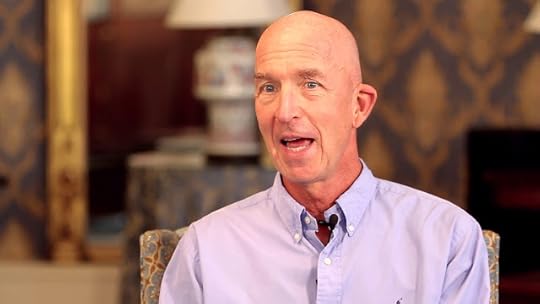 'Highlights from Dr. Stephen Smith's talk at the John Hope Franklin Center as part of our weekly Wednesdays at the Center series. The 'Scramble for Europe' will become as likely inexorable, as was the 'Scramble for Africa' at the end of the 19th century. Then it was all about raw materials and national pride. Europe's "wretched refuse" migrated massively to America, not Africa. Now it is about young Africans seeking a better life on the Old Continent, the island of prosperity within their reach. If Africa's migratory patterns continue as is, Europe would count in fifty years 150 million Afro-Europeans compared to today’s 9 million today. A quarter of Europe’s population would be of African origin.' -- John Hope Franklin Center at Duke University
'Highlights from Dr. Stephen Smith's talk at the John Hope Franklin Center as part of our weekly Wednesdays at the Center series. The 'Scramble for Europe' will become as likely inexorable, as was the 'Scramble for Africa' at the end of the 19th century. Then it was all about raw materials and national pride. Europe's "wretched refuse" migrated massively to America, not Africa. Now it is about young Africans seeking a better life on the Old Continent, the island of prosperity within their reach. If Africa's migratory patterns continue as is, Europe would count in fifty years 150 million Afro-Europeans compared to today’s 9 million today. A quarter of Europe’s population would be of African origin.' -- John Hope Franklin Center at Duke University
Published on November 04, 2018 04:30
Left of Black S9:E5: Black Disability or Blackness Disabled? A Conversation with Therí A. Pickens
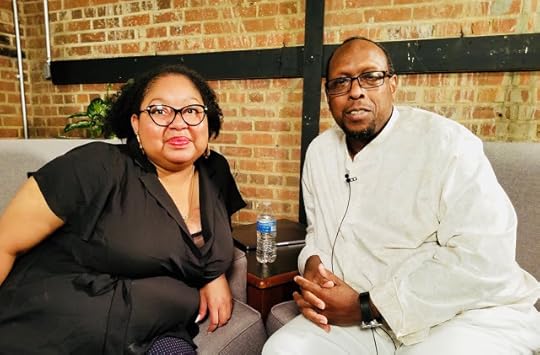 Left of Black host Mark Anthony Neal is joined in the studio by literary scholar, Therí Pickens (@TAPPhD), an Associate Professor of English at Bates College. She is the author of New Body Politics: Narrating Arab and Black Identity in the Contemporary United States (Routledge 2014).
Left of Black host Mark Anthony Neal is joined in the studio by literary scholar, Therí Pickens (@TAPPhD), an Associate Professor of English at Bates College. She is the author of New Body Politics: Narrating Arab and Black Identity in the Contemporary United States (Routledge 2014).
Published on November 04, 2018 04:22
Christopher Tinson | Warring With Democracy: Black Activism & the Challenge of History
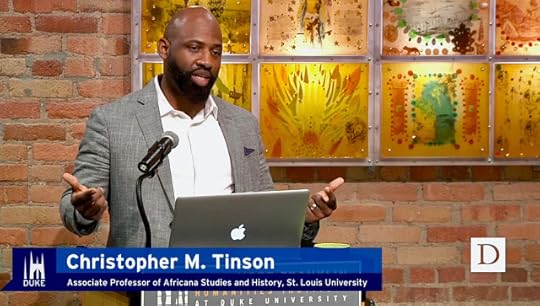 'Prof. Christopher Tinson is the 2018 winner of the inaugural Pauli Murray Book Prize from the African American Intellectual History Society for his latest publication, Radical Intellect: Liberator Magazine and Black Activism in the 1960's.' -- Duke Franklin Humanities Institute
'Prof. Christopher Tinson is the 2018 winner of the inaugural Pauli Murray Book Prize from the African American Intellectual History Society for his latest publication, Radical Intellect: Liberator Magazine and Black Activism in the 1960's.' -- Duke Franklin Humanities Institute
Published on November 04, 2018 04:05
Mark Anthony Neal's Blog
- Mark Anthony Neal's profile
- 30 followers
Mark Anthony Neal isn't a Goodreads Author
(yet),
but they
do have a blog,
so here are some recent posts imported from
their feed.



